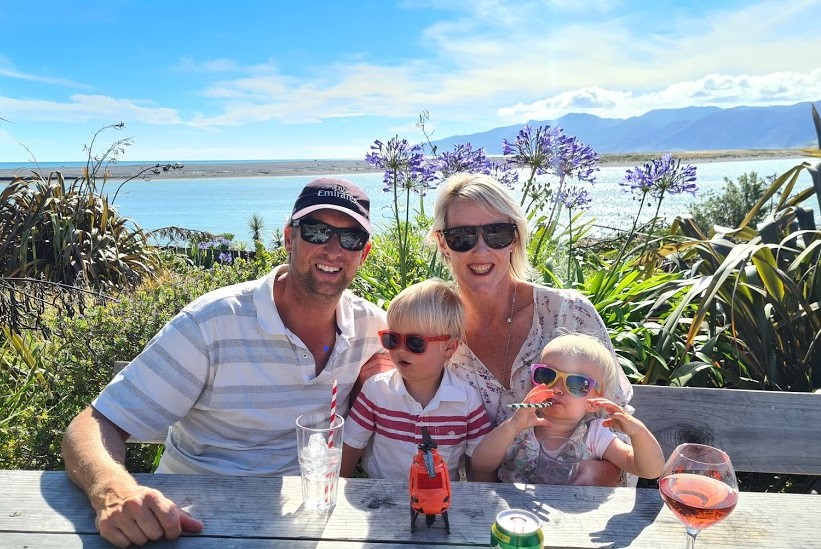Pictured: Sarah Dalziell-Clout and her family at their local, Lake Ferry - just down the road from rural Kahutara where she resides.
What first attracted you to the flexible work that Juno offers, and can you tell us about your favourite part of the job?
The flex! Obviously this space has been transformed since Covid with the wide-spread adoption of flexible working across most organisations, but at the time, that wasn’t always the case, and in most instances it was a privilege gained only with time. Juno understood the juggle and was happy to be my advocate for this, without an underlying scepticism about my work-ethic or career aspirations.
What do you love about it now?
I really enjoy the opportunity to get to experience a range of sectors, businesses, environments and people. It’s fascinating learning about a business or a sector that you might never have otherwise considered in any detail. The technical elements of being an in-house lawyer – of understanding the law and managing risk – are fairly transferable, but what makes our role as Juno lawyers exciting and refreshing is in understanding the context of each new engagement - the business, their operations, processes, priorities and people. From logistics to high performance sport, from sole GC support to joining a large legal team, and from project support to general commercial support – I’ve been fortunate to have had a wide range of experiences.
Did you have any reservations/challenges to making that change and how did you overcome them?
The one worry that I did have prior to commencing with Juno was that I might not have the continuity of work to enable the financial stability required in our household. Thankfully, that concern has been unwarranted. In the three years that I have been with Juno Legal, I have commenced two short-term engagements that have extended into longer-term support, extending beyond a year each. I think this reflects the trust gained and the confidence earned between myself and those that I have been supporting.
I also now know the quality and calibre of people that Juno recruits only serve to enhance our brand and reputation in the profession.
How do you manage balance in your life to ensure time for your personal projects?
Managing the balance has to be a personal priority. I’m not sure that it comes easily or naturally for lawyers who are, by our nature, perfectionists and struggle to commit to anything at less than the best. I don’t know that I always have the balance right myself – it’s a bit of a continuous juggling act. But I’m very aware of the things that I need to do to make myself more present in work, social and home environments. For me, it’s doing something physical each day – be that tennis, squash, riding horses or dealing with our large extended family of animals. I know that if I don’t make some time to do that, then I won’t be as effective or as engaged as I can be, so it has to be a non-negotiable at some point in my day.
Can you tell us what makes a great Juno engagement for you and for the client, particularly from a remote-engagement perspective?
Having trust and confidence is critical, in my view, to a successful Juno engagement. Obviously this takes time to develop if relationships do not already exist, so communication and being “present” is really important to building that relationship.
As a starter, I think taking the time up-front to meet - in person if possible – is really valuable.
For a Juno lawyer, the key stakeholders and colleagues will obviously provide the best context and understanding of the business and their risk appetite. However, developing a rapport and connection on a personal basis, is key. As someone who provides support largely remotely, I’ve found it really valuable to have regular scheduled in-person or “Teams” meetings with those that I’m regularly supporting or reporting to as this prompts discussion, ongoing connection and dialogue that would typically be gained from working next to each other in an office. Understanding the “person” with whom you work can so easily be lost in emails or messenger-type dialogue only.
